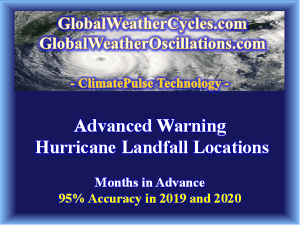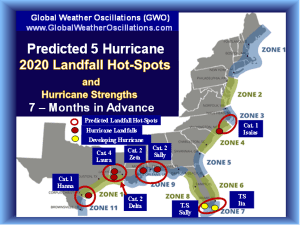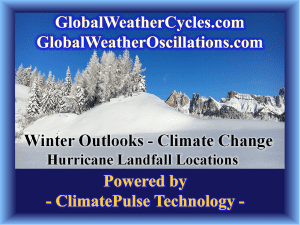The 2021 and 2022 hurricane seasons have been intense and costly. Question: are more frequent hurricanes caused by climate change?
OCALA, FLORIDA, UNITED STATES, September 9, 2021 /EINPresswire.com/ — Back in 2015, Professor Dilley of Global Weather Oscillations (GWO) – predicted that the current active landfall cycle would begin in 2016. And it came as expected with the United States having 16 hurricane landfalls during the next six years (up to early September 2021). Also as predicted – several major hurricanes with extensive damage – including Major Hurricanes Ida, Harvey, and Michael. All 16 landfall strengths and locations were predicted months in advance by Professor Dilley.
Following the 2020 hurricane season that saw the United States experience 6 hurricane landfalls – Professor David Dilley of Global Weather Oscillations (GWO) said that the 2021 season would be more dangerous and costly due to hurricanes and remnants of hurricanes hitting more populated regions of the United States. And as of early September – the current 2021 hurricane season has been just that – deadly and on track to be one of the costliest.
Many people are suggesting that the increase in hurricanes is due to climate change. Are their assumptions correct? Will hurricanes become even more frequent and dangerous in the upcoming years? Has there ever been similar United States hurricane landfall frequencies in the past, or is today an earmark for what is to come in the future?
To answer the questions and to gain a better understanding of what is occurring today, we should learn from the past so we can understand what is occurring today – and what will likely occur in the future.
The first step is to look at the history books since 1830 and examine how many United States hurricane landfalls occurred on an annual basis during this 170-year period. Then examine climate change temperatures and ocean temperatures during the same period – and their associated warm and cool cycles.
Research by Professor David Dilley found there were three distinct very active United States hurricane landfall periods that lasted 25-30 years and recurred on a 70-year cycle. Each cycle was very similar to today in both the number of hurricane landfalls and intensities. In addition, these very active landfall cycles occurred at the same time as the three Atlantic Basin warm water cycles (the Atlantic Basin encompasses the Gulf of Mexico, Caribbean, and the Atlantic Ocean).
The 70-year cycles of the warm ocean phases and hurricane landfall cycles all peaked simultaneously around the years 1880, 1950, and are once again peaking 70-years later with the current onslaught of hurricane activity. It should be noted that the peaks of the first two active landfall cycles (1880 and 1950) occurred during periods of much cooler weather in the United States and globally. Also of special interest is that 80% of the “most damaging” hurricanes (not costliest) to hit the United States occurred outside of the very active hurricane cycles and during cooler United States weather periods (the most damaging hurricanes occurred in 1900-1915-1926-1928-1938-1944-1960-1992-2005-2012).
Now we come to the current 70-year active landfall cycle that began in 1916. Although the United States and much of the world were experiencing much warmer than normal weather during the period from 2009 through 2015, the United States experienced only 3 hurricane landfalls and no major hurricanes during this seven-year period. Then in the year 2016, the Atlantic Basin entered its recurring 70-year warm water cycle in conjunction with the 70-year active United States landfall cycle. This ushered in the currently very active United States landfall cycle that is very similar to the other two cycles that occurred since 1880. The current active cycle will continue for at least 25-years (2016-2031) and then reverse back to a quieter cycle – regardless of either a global warming or cooling cycle occurring at the time.
Research by Global Weather Oscillations (GWO) (www.globalweatheroscillations.com) and Professor Dilley strongly emphasize that annual hotspots for United States hurricane landfalls are very predictable and strongly linked to ClimatePulse Cycles associated with earth-moon-sun gravitational cycles. More information is available on the sites GlobalWeatherCycles.com and GlobalWeatherOscillations.com.
GWO has 11 United States prediction zones, and utilizing ClimatePulse technology developed by Professor Dilley. During the hurricane season, GWO provides Landfall Tracking Webinars that incorporate GWO’s ClimatePulse predictions for the 2021 Hurricane Season. And because GWO already knows where the hurricane landfall hot spots are for the season, the interactive tracking webinars are extremely important to GWO’s clients by providing – more time to prepare – and more accurate path and strength predictions 8 to 12 days in advance. As an added bonus GWO also provides free email updates to its clients as storms are approaching landfall locations informing them of up-to-date information and often times important changes.
Global Weather Oscillations is a working partner with the International Hurricane Protection Association (INHPA).
Professor David Dilley
Global Weather Oscillations
+1 352-789-4461
dilley@GlobalWeatherOscillations.com
Visit us on social media:
LinkedIn



